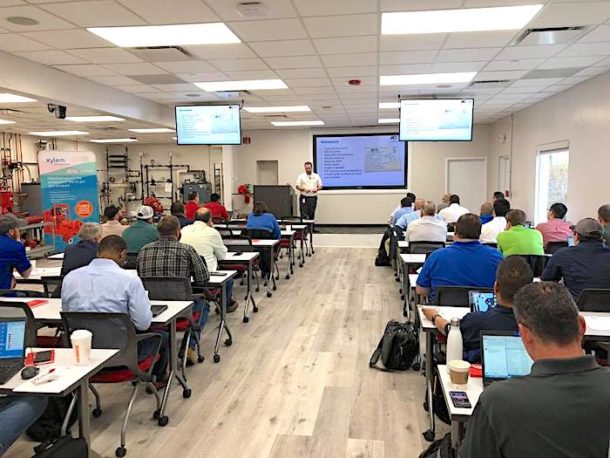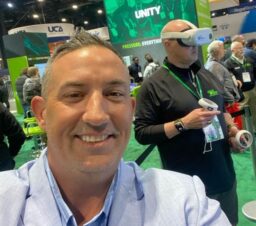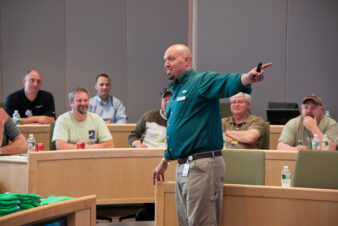By Norman Hall
A competitor recently asked how we can afford to spend so much time and money training our employees and our customers. My response is, “How can you afford not to train your people?” I would argue that education should be a prominent expense item for all contractors, wholesalers, and representatives in the HVAC and plumbing world. In this industry, where product and technical information can feel like a tsunami, customers rely on us to act as trusted advisors guiding them to the best solution. Our staff cannot simply exist as a walking, talking brochure. Arming our people with the knowledge and empowerment to think critically and to act with integrity has resulted in a thriving business and a dedicated customer base here at R.L. Deppmann.

“OK, Show Me the Boiler and I’ll Help you out.”
A few months ago, I was at lunch with a commercial mechanical contractor. By the way, it was a real lunch, not a Zoom meeting. The contractor started asking about the importance of the R. L. Deppmann seminar series for the winter season. He told me the story. Last fall he purchased some equipment for a project from a competitor. The equipment was installed and ran fine for a short time. In the spring he received a call from the owner. There were complaints of sporadic shutdowns of the boiler. The younger salesperson who took the original order was called out to the jobsite to assist in troubleshooting.
The rep stood in the mechanical room and asked the contractor to take him to the equipment with the trouble. The response was, “it’s right behind you.” Imagine the look on the contractor’s face. The young salesperson was embarrassed and the customer lost confidence. No one wants this to be a story in their company.
Starting in the Industry
Employees are valuable assets of any successful company. Today, it appears there are more positions available than people to fill them. The result is a younger work force that is changing jobs and careers. The person you are hiring may have little knowledge of the industry and certainly little knowledge of your company.
Exposing this new employee to knowledge about the company, the job, and the growth opportunities is paramount. The new employee will leave you or you may leave them if they are not successful in a short time. There is a roadmap to training if you are willing to invest in it.
The New Employee Education Road Map

Image Credit: Carbuyer
Our company, R. L. Deppmann, is a successful manufacturer’s representative of hydronic, steam, and plumbing products in Michigan and Ohio. Our customers call us to help them solve problems because we have, and teach, the knowledge they need. How does this happen? Our hiring pool on the sales and engineering end is no different than other companies, but the training program is.
- Start with core values and what the company is all about. Our new employees are purposely exposed to the company business and culture three times in the first few weeks of their career. The HR department presents, the managing supervisor presents, and a senior manager describes the business and culture.
- Know the team that supports you. Our customers are contractors, wholesalers, and owners. It is important for the new inside or outside salesperson to understand the various departments of support.
- The new sales rep spends a short time in the warehouse, learning, seeing, and touching the products. They also begin to learn the ERP and CRM systems.
- Next, they move into the startup and warranty (service) department. Here they begin to see installed products and how they are commissioned. With the Service Tech as their mentor, the employee will gather knowledge of the terms used in the industry, proper installation, and troubleshooting. There is also a chance to interface with customers.
- Customer service/inside sales is the next stop. Here they begin the process of satisfying customer requests. They learn product, parts, and our business systems. They work in a team with open conversation about the hundreds of different product types and customer issues. The employee learns to help the customer make a better decision about what they are asking for.
- We have a strong new construction business. The salesperson will learn the plans, specifications, proper selection and sizing, proper detailing to avoid issues, and pricing. Here there is the baseline process of speaking with contractors, wholesalers, engineers, and coordinating with other employees.
- By this time, the employee is well into their training period. They now go out on calls with a senior sales rep. They are prepared with some understanding of product, installation, troubleshooting, selection, and quoting. Daily discussions with the senior rep will fill in the features, benefit, and competitive landscape for company and individual success.
- Now the employee is prepared to be a resource for their customer. They understand who knows what and the resources available to satisfy the customer’s needs. The new employee feels like they are part of a team. They may have developed a friendship with other employees. They feel like they belong.
Getting Started: How to Create a Training Program
This program may seem difficult to start. We developed this over many years. The departments a new employee is exposed to changes with their job. An accounting employee will go through the core ideology training. They may not experience the customer service department but warehouse experience in return goods or the purchasing process knowledge may help them do their job better.
Start with that core ideology process. Make sure the employee understands who you are, where you fit in the industry, and what to think about when making decisions. Next, just pick one support department for the job and list what they need to know about it. Communicate with all the department employees what the goal is and just try it out for a couple weeks. You will develop your own program.
Next quarter I’ll share the continuing training program we use once the employee is in the job full time.
 Norman Hall is an engineer and leader at the R. L. Deppmann Company, a manufacturer’s representative, in Michigan and Ohio. Norm has assisted in the design and troubleshooting of hydronic and steam systems for 45 years.
Norman Hall is an engineer and leader at the R. L. Deppmann Company, a manufacturer’s representative, in Michigan and Ohio. Norm has assisted in the design and troubleshooting of hydronic and steam systems for 45 years.



